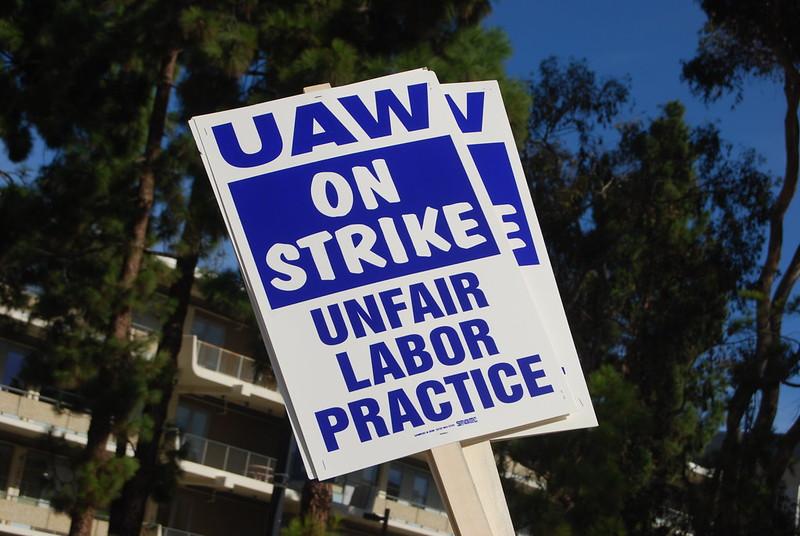This article is part of our ongoing coverage of the 2022 academic workers’ strike. Please visit Fair UC Now for more details of the strike.
Thousands of University of California academic workers began striking today, Nov. 14, across 10 campuses, demanding fair contracts and higher pay from the UC, in accommodation with the increased cost of living.
Starting late October, the United Auto Workers union (UAW 5810, UAW 2865, and SRU-UAW), which represents 48,000 academic workers such as TAs, post-docs, graders, tutors, and academic researchers, held a 10-day authorization vote for a multi-unit lawful strike, with 98% of their 36,558 members voting “Yes” to authorize a strike. This is the largest and most decisive strike authorization vote taken by UC academic workers.
“This [vote] really sends the message to the UC, that we’re united, and we’re ready to hold them accountable,” fifth-year doctoral candidate Maddie Williams said. “What we’re fighting for is for people to be lifted out of the rent burden across the board with that minimum increase in salary.”
UAW outlines in their housing proposal that the current starting minimum income for teaching assistants or student researchers is $23,246.50 for one academic year — or $2,583 per academic month — constituting only 30% of the San Diego Area Median Income and falling under the category of “extremely low income.” Given the high inflation this year, UC’s originally proposed wage change would even cause a 5% real wage decrease.
“Our working conditions are oftentimes also the research conditions for people’s PIs or supervisors,” Williams said. “And the quality of education that we are able to provide, as well as the quality of research, is compromised because we’re struggling to make ends meet.” Williams also serves as a representative in the teaching assistants’ bargaining team UAW 2865.
UAW surveys show that 92% of graduate student workers and 61% of postdocs spend more than 30% of their gross income on housing, exceeding the federally established affordability limit. UC-owned housing is not a promising alternative, either; at UC San Diego, only 13% of postdocs and 14% of academic researchers can secure housing.
According to second-year Postdoctoral Fellow Adam Caparco, a higher base rate doesn’t make postdocs’ life easier; as he explained, “postdocs are of an age where we could be starting a family — we’re not really in school anymore — we think about things like infertility benefits and dependent care structure.”
Caparco also shared that postdocs usually have fewer healthcare benefits compared to other units, and what they’re trying to do is to “get closer to what they should be paid.”
Caparco has been involved in the bargaining process for over a year. Meanwhile, the UC has not created a transparent and fair bargaining environment but instead “broke the law for negotiating.”
“The university is undermining the good faith in negotiations by providing a band-aid to placate a small group of people, instead of actually improving the working conditions for everyone,” Caparco explained. “That’s not acceptable for negotiations.”
UAW is currently demanding $54,000 and $70,000 as the annual base rate for all graduate workers and postdocs, respectively. The UC, as the biggest employer in California, has a $46 billion annual budget. Even if all proposed compensation requests are fulfilled, it constitutes less than 3% of the total budget, as pointed out by Williams.
Aside from their inability to implement fair compensation, UAW alleges that UC campuses have failed to meet their legal obligations, including creating a transparent negotiation process.
“The cross-unit strike [is meant] to compel [UC campuses] to bargain fairly, remedy its unlawful conflict, conduct, and help settle a fair contract,” Williams said. “There is no end date set for the strike, but the University can at any point choose to stop their unfair labor practices and bargain with us fairly. It’s really in their hands.”
When asked if the strike would potentially disrupt undergraduate learning, Williams responded, “it is worth a long-term improvement to everyone’s experience at UC. I would also say that not every teaching moment happens in a classroom. When we’re being treated unfairly, it’s up to us to use the power of the collective to our ability, and come together and speak up against the power.”
In response to this potential UAW strike, UCSD Vice Chancellor Simmons released guidance regarding the continuity of research, noting that UCSD “respects the rights of represented employees to bargain collectively … and to perform legally protected strike activities.”
Fourth-year doctoral candidate Sam Ridge, who is also the philosophy department strike captain, requested faculty members to pause in-person classes to respect the picket lines. Meanwhile, not all teaching staff have announced accommodations with respect to the strike period.
“The official stand from some other departments or individual faculty members is only doing what they’re legally required for the legally protected strike, but will not do more than that,” Ridge said. “I’ve heard from some graduates in other departments that their faculties don’t even legally respect students’ rights to strike. What that means is that people are retaliating against participating in unfair labor practice- or strike-related activities.”
Aside from fair compensation in adjustment to the increased cost of living, UAW’s Core Demands also include sustainable public transit for climate protection, support for working parents, and international scholar rights. As of this story’s publication, articles including Grievance and Attribution and Respectful Work Environment reached tentative agreements.
UC released an official response, stating that “UC believes its offers are generous, responsive to union priorities, and recognize the many valuable contributions of these employees … [and] UC is committed to continuing to negotiate in good faith and reaching full agreements as soon as possible.”
More information regarding picket lines and bargaining updates can be found on UAW’s official website.
Photo by Sophie Nourbakhsh for the UCSD Guardian.
Video by Leonardo Gonzalez and Kathleen Shiroma.















Julie Taylor • Nov 15, 2022 at 8:17 am
Do Work At your Home And Make Money From Home .,..
Open This Link …>http://www.richsalaries4u.blogspot.com/